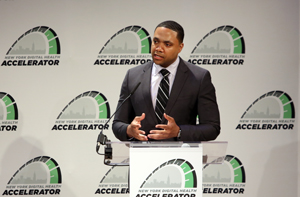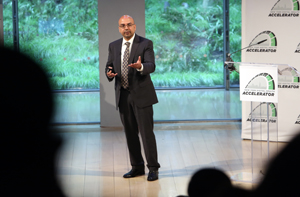For those selected as the inaugural class of the New York Digital Accelerator, it was a graduation day of sorts. After nine months of intense work, the eight health IT companies whose products ranked most promising, out of 250 applicants, presented their results on Wednesday morning at the Times Center.
Each company was matched with some of the most senior-level executives from 23 leading healthcare provider organizations in New York. These hospital and health system executives were the very people who would ultimately become clients, and access to them during the process of product development and refinement was invaluable in crafting precisely the solutions that could be most beneficial to patients.
The investors of the Accelerator have invested $3.7m in funding into the inaugural class. New York State provided 500k for program operations.
“This class is about innovation,” Maria Gotsch, President and CEO of the Partnership Fund for New York City, told an audience of over 350. “But most importantly, it’s about innovation deployed.” Seventeen pilots are already underway from the first class; lives have already been saved.
Dr. Nirav R. Shah, the commissioner of the New York State Department of Health, pointed out that the California Healthcare Foundation called the program “one of the most successful accelerator models in the country.” And that the Rotman School of Management ranked it the number one Health IT Accelerator in the world, as compared to 21 similar programs.
At its current pace, he added, over the next five years, the program is projected to create 1,500 jobs and generate $150 million to $200 million in additional venture capital investment, further stimulating New York as the place to be for health IT.
Each of the eight companies were allotted time on stage to discuss their results and pitch to investors in the room.
Eyal Ephrat, founder and CEO of MedCPU, a member of the inaugural class, talked about the overwhelming number of people who die each year from clinical errors. His company has created a product that captures free-text notes, dictations, and structured documentation of clinicians and analyzes them against a library of best practices.
He presented a case from the previous Friday: The clinical notes of a real patient prescribed with a medication that could have potentially killed him, as the prescribing physician was unaware the patient had hepatitis C. The system read the clinical notes in time, caught the error, and the prescription was canceled. The patient’s life was saved, and the audience applauded. Cases such as this represent some of the program’s very real life success.
See more pictures of Demo Day.





